小学五年级英语特殊疑问句语法
五年级上册英语的特殊疑问句和答语的语句

五年级上册英语的特殊疑问句和答语的语句Special interrogative sentences in English refers to questions that require a specific piece of information as an answer. In Chinese, 特殊疑问句指的是需要具体信息作为答案的问题。
For example, questions starting with words like "what," "where," "when," "why," "who," and "how" are considered special interrogative sentences. 例如,以“什么”、“在哪里”、“什么时候”、“为什么”、“谁”和“怎么”等词开头的问题被认为是特殊疑问句。
One common special interrogative sentence in English is "Where do you live?" In Chinese, this would be translated as “你住在哪里?” These types of questions help gather specific information about a person or a situation. 这些问题有助于获取有关一个人或一个情况的具体信息。
Being able to ask and understand special interrogative sentences is important in daily communication as they help in clarifying doubts and seeking information. 能够询问和理解特殊疑问句在日常交流中很重要,因为它们有助于澄清疑问和获取信息。
小学英语五年级特殊疑问句
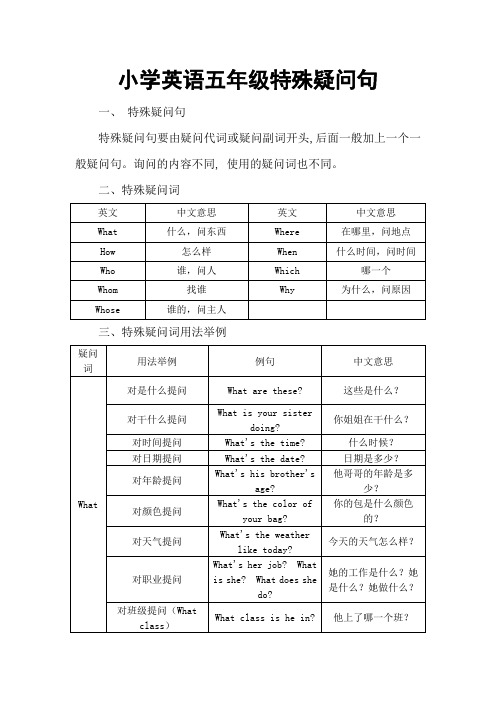
小学英语五年级特殊疑问句一、特殊疑问句特殊疑问句要由疑问代词或疑问副词开头,后面一般加上一个一般疑问句。
询问的内容不同, 使用的疑问词也不同。
二、特殊疑问词三、特殊疑问词用法举例四、疑问词填空练习【牛刀小试】1.( ) do you like?2.( ) many birds do you see?3.( ) is that man?4.( )can you do ?5.—( ) your name?—My name’s Amy.6.—( ) this/that?—It’s a bear!7.—( ) do you like?—I like watermelons.8.—( ) in the classroom?—One blackboard, one TV, many desks and...—It’s blue and white.10.—( )would you like for dinner?—I’d like some beef and noodles.11.—( )your father’s job?—My father is a doctor.12.—( )time is it?—It’s 9 o’clock.13.—( ) the weather like in London?—It's rainy.14.—( ) are these/those?—They are tomatoes.15.—( )are you?—I’m fine. Thank you./ Very well. Thanks. 16.—( )old are you?—I’m twelve years old.17.—( ) many kites do you see/have?—I see/have ten kites.18.—( ) many people are there in your family? —Nine.19.—( ) much is it?—It’s 89 dollars.—I’m from the USA. 21.—( ) is my car?—It’s under the chair. 22.—( )is it?—It’s near the window.’23.—( ) is the library? —It’s on the second floor.24.—( )is that boy?—He is my brother. 25.—( )is he?—He is Zhang Peng. 26.—( )coat is it?—It's your father’s. 27.—( )are these? —They are mine.28.( )is the crayon?—It's in the pencil box. 29.( ) is that girl? ---She is my sister .。
五年级特殊疑问句
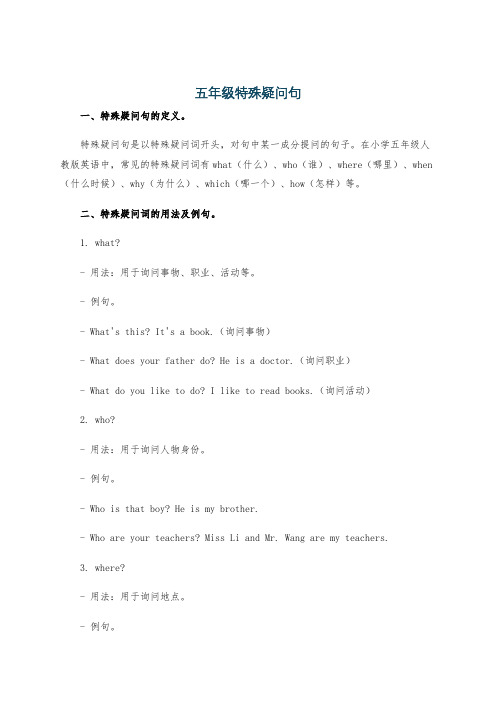
五年级特殊疑问句一、特殊疑问句的定义。
特殊疑问句是以特殊疑问词开头,对句中某一成分提问的句子。
在小学五年级人教版英语中,常见的特殊疑问词有what(什么)、who(谁)、where(哪里)、when (什么时候)、why(为什么)、which(哪一个)、how(怎样)等。
二、特殊疑问词的用法及例句。
1. what?- 用法:用于询问事物、职业、活动等。
- 例句。
- What's this? It's a book.(询问事物)- What does your father do? He is a doctor.(询问职业)- What do you like to do? I like to read books.(询问活动)2. who?- 用法:用于询问人物身份。
- 例句。
- Who is that boy? He is my brother.- Who are your teachers? Miss Li and Mr. Wang are my teachers.3. where?- 用法:用于询问地点。
- 例句。
- Where is your school? It is near my home.- Where are you going? I'm going to the park.4. when?- 用法:用于询问时间。
- 例句。
- When do you get up? I get up at six o'clock.- When is your birthday? It's in May.5. why?- 用法:用于询问原因。
- 例句。
- Why are you late? Because I missed the bus.- Why do you like spring? Because it's warm and beautiful.6. which.- 用法:用于在一定范围内询问哪一个。
五年级英语特殊疑问词组成的句子,并带翻意
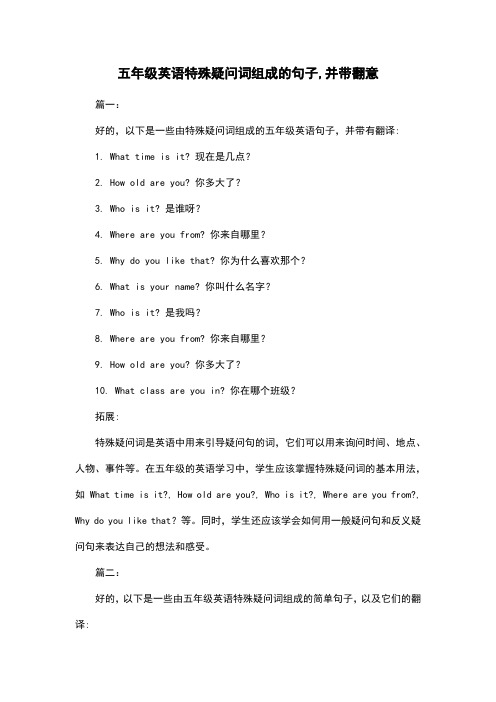
五年级英语特殊疑问词组成的句子,并带翻意篇一:好的,以下是一些由特殊疑问词组成的五年级英语句子,并带有翻译:1. What time is it? 现在是几点?2. How old are you? 你多大了?3. Who is it? 是谁呀?4. Where are you from? 你来自哪里?5. Why do you like that? 你为什么喜欢那个?6. What is your name? 你叫什么名字?7. Who is it? 是我吗?8. Where are you from? 你来自哪里?9. How old are you? 你多大了?10. What class are you in? 你在哪个班级?拓展:特殊疑问词是英语中用来引导疑问句的词,它们可以用来询问时间、地点、人物、事件等。
在五年级的英语学习中,学生应该掌握特殊疑问词的基本用法,如 What time is it?, How old are you?, Who is it?, Where are you from?, Why do you like that?等。
同时,学生还应该学会如何用一般疑问句和反义疑问句来表达自己的想法和感受。
篇二:好的,以下是一些由五年级英语特殊疑问词组成的简单句子,以及它们的翻译:1. What time is it? 现在是几点?2. Where are you from? 你来自哪里?3. Who is that? 是谁啊?4. When did you go to the park? 你什么时候去公园的?5. Why do you like pandas? 你为什么喜欢熊猫?6. How old are you? 你多大了?7. What is your name? 你叫什么名字?8. Where are you from? 你来自哪里?9. Who is your teacher? 你的老师是谁?10. When are you going to the park? 你什么时候去公园?在这些句子中,特殊疑问词被用来询问个人信息、事件、地点或时间。
五年级上册英语的特殊疑问句和答语的语句

五年级上册英语的特殊疑问句和答语的语句在我们学习五年级上册英语的过程中,特殊疑问句和答语可是非常重要的一部分。
特殊疑问句能够帮助我们获取更多具体的信息,而答语则是对这些问题的回应。
先来说说特殊疑问句。
特殊疑问句是用特殊疑问词引导的问句,常见的特殊疑问词有“what(什么)”“where(哪里)”“who(谁)”“whose (谁的)”“when(什么时候)”“why(为什么)”“how(怎么样)”等等。
比如,“What do you like?” (你喜欢什么?)这就是用“what”引导的特殊疑问句,在回答这个问题时,我们可以说“I like apples” (我喜欢苹果。
)再看“Where is the library?” (图书馆在哪里?)这里用的是“where”,如果要回答,可以是“The library is near the school” (图书馆在学校附近。
)“Who is your best friend?” (谁是你最好的朋友?)这是由“who”开头的特殊疑问句,回答可能是“My best friend is Lily”(我最好的朋友是莉莉。
)“Whose book is this?” (这是谁的书?)回答也许是“It's Tom's book” (这是汤姆的书。
)“ When do you get up?” (你什么时候起床?)“I get up at six o'clock” (我六点起床。
)“Why are you sad?” (你为什么伤心?)“Because I lost my pen” (因为我丢了我的钢笔。
)“How do you go to school?” (你怎么去上学?)“I go to school by bike” (我骑自行车去上学。
)在学习特殊疑问句和答语的时候,要注意特殊疑问词的用法,以及答语要和问句相对应,保持逻辑一致。
小学五年级英语语法

小学五年级英语语法一、特殊疑问句表示疑问,有疑问词(在开头),回答有很多种可能。
常用疑问词:疑问词意思用法What time 什么时间问具体时间,如几点钟Who 谁问人Whose 谁的问主人Where 在哪里问地点What 什么问东西、事物What colour 什么颜色问颜色How old 多大年纪问年纪How many 多少数量(可数名词)问数量How much 多少钱;多少数量(不可数名词)问多少钱或数量(不可数)二、一般疑问句如何将一个肯定的陈述句改为一般疑问句:1、看句中有无be动词,如有,把be动词提到句首即可。
2、看句中有无情态动词,如有,把情态动词提到句首即可。
3、如上述二者都没有,就应把助动提到句首。
分四个步骤:(1)肯定陈述句中本来是没有助动词的,要加上去,位置在主语(某人或某物)后,动词前。
(2)确定助动词用do还是does,根据句中动词,动词是原形的助动词就用do,动词是第三人称单数的助动词就用does(3)把助动词后提到句首。
(4)原句中动词假如发生变化就要恢复成原形。
强调一点,有some的要考虑是否要用any。
三、一般将来时表示将来将要发生的动作,经常和tomorrow, next year, the day after tomorrow, the year after the next, in five hours' time, etc. 表示将来的词联用。
结构:主语+助动词will+动词原形I will go to America tomorrow.The pilot will fly to Japan the month after the next.Jack will move into his new house tomorrow morning.★变疑问句将助动词移到句首Will you go to America tomorrow?Will the pilot fly to Japan the month after the next?Will Jack move into his new house tomorrow morning?★变否定句在助动词后面加notI will not go to America tomorrow.The pilot will not fly to Japan the month after the next.Jack will not move into his new house tomorrow morning.★肯定回答及否定回答Yes, I will. / No, I will not.Yes, he/she will. / No, he/she will not.Yes, he will. / No, he will not.★特殊疑问句What will you do?四、现在进行时表示现在正在进行的动作。
小学五年级上册英语第三单元语法知识总结

小学五年级上册英语第三单元语法知识总结小学五年级上册英语第三单元语法知识总结想要提高自己的学习成绩,超越别人,就要在别人还玩耍的时候,自己静静的学习。
做好超越别人的准备了吗?为大家分享五年级上册英语第三单元语法知识归纳,希望能帮到大家。
1、Whatareyougoingtodo?你想做什么?询问他人在未来的打算。
Begoingto后面要跟动词的原形。
2、thisevening和tonight的区别:thisevening指的是今天晚上睡觉以前的时间,一般指晚上十二点以前。
而tonight指的是今晚,一般是指一整晚的时间,通宵。
3、特殊疑问句1)、结构:特殊疑问词+一般疑问句的形式(一般情况下)例:Whichdoyoulikebetter?特例:whathappenedtotheotherpeopleontheplane?2)、特殊疑问词的分类:疑问代词:what;who;which;whom疑问形容词:what+名词;which+名词;whose+名词疑问副词:when;where;why;how3)、疑问代词的用法:(1)What“什么”用来问是什么,做什么,叫什么,什么样,询问职业等等。
例:Whatisyourname?你的名字叫什么?Whatisyourfather?你爸爸是干什么的?(询问职业)=Whatdoesyourfatherdo?Whatisyourhobby?你的爱好是什么?Whatisyourfavouritefood?你最喜爱的食物是什么?What’syourmathteacherlike?你的数学老师长得什么样子?Whatisthedatetoday?今天几月几号?ItisMay1st.(2)who“谁”用来问人物是谁。
例:WhoisyourEnglishteacher?你的英语老师是谁?Who’sthatman?那个男人是谁?(3)which“哪种、哪一个”例:Whichdoyoulikebetter?4)、疑问形容词的用法:(1)whattime“几点了”用来问具体的时间,如:Whattimeisit?现在几点了?(2)Whatcolour”什么颜色”用来问物体的颜色。
五年级下册英语,1到10模块,特殊疑问句,一般疑问句,总结(一)
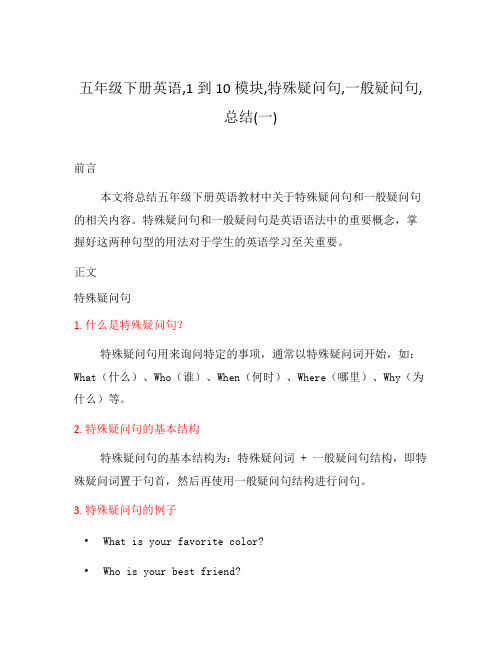
五年级下册英语,1到10模块,特殊疑问句,一般疑问句,总结(一)前言本文将总结五年级下册英语教材中关于特殊疑问句和一般疑问句的相关内容。
特殊疑问句和一般疑问句是英语语法中的重要概念,掌握好这两种句型的用法对于学生的英语学习至关重要。
正文特殊疑问句1. 什么是特殊疑问句?特殊疑问句用来询问特定的事项,通常以特殊疑问词开始,如:What(什么)、Who(谁)、When(何时)、Where(哪里)、Why(为什么)等。
2. 特殊疑问句的基本结构特殊疑问句的基本结构为:特殊疑问词 + 一般疑问句结构,即特殊疑问词置于句首,然后再使用一般疑问句结构进行问句。
3. 特殊疑问句的例子•What is your favorite color?•Who is your best friend?•When is your birthday?•Where do you live?•Why are you crying?一般疑问句1. 什么是一般疑问句?一般疑问句用于询问是否某种情况存在,通常以be动词或助动词开头,并用词序上的倒装,即将助动词或be动词置于主语之前。
2. 一般疑问句的基本结构一般疑问句的基本结构为:助动词/Be动词 + 主语 + 其他+ ?,即将助动词或be动词置于主语之前,并使用各种时态的一般疑问句结构进行问句。
3. 一般疑问句的例子•Are you a student?•Is she playing basketball?•Can you swim?•Will they come tomorrow?•Have you finished your homework?结尾特殊疑问句和一般疑问句是英语语法中非常重要的句型,它们在日常交流中经常被使用到。
通过学习和掌握特殊疑问句和一般疑问句的用法,学生可以更流利地使用英语进行提问和回答。
希望本文对同学们的英语学习有所帮助。
特殊疑问句的练习以下是一些练习题,帮助你巩固特殊疑问句的用法。
五年级下册特殊疑问句和一般疑问句
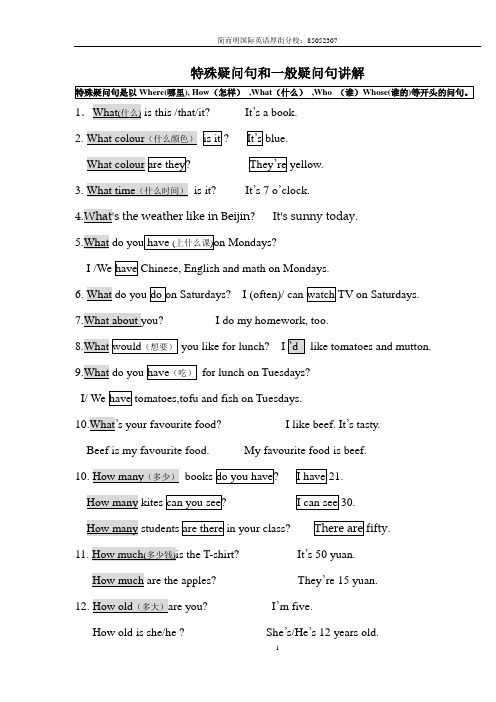
Where are my shoes?
They are on your feet.
Where are you from?
I’m from America.
Where is he/she from?
He/She’s from China.
一般疑问句是以 be(am ,are ,is ),can, do 开头的句子,一般要用 Yes/No 回答
4. Are there any dogs on the farm? Yes, there are . No, there aren’t.
5. Can you do housework? Yes, I can.
No, I can’t .
Can Amy(she ) do housework? Yes, she can.
No, you can’t.
6. Do you like pears? Yes, I do.
No, I don’t.
Do you have noodles? Yes, I/ We do.
No,ቤተ መጻሕፍቲ ባይዱI / We don’t.
7.Would you like some grapes? Yes, please.
I/ We have tomatoes,tofu and fish on Tuesdays.
10.What’s your favourite food?
I like beef. It’s tasty.
Beef is my favourite food.
My favourite food is beef.
13. How are you?
I’m fine.
14.Who(谁) is your English teacher?
小学五年级英语句型详解五篇

【导语】五年级学⽣学习英语的过程中,不仅要提升单词的掌握程度,同时也要做好对语法和举⾏的相关理解,以下是⽆忧考为⼤家整理的内容,欢迎阅读参考。
【篇⼀】⼩学五年级英语句型详解:特殊疑问句 1. 定义 以特殊疑问词开头,对陈述句中的某⼀部分提出疑问 / 进⾏发问的句⼦叫特殊疑问句。
2. 特殊疑问词全搜索 ⼀句话: wh-开头外加能与之结伴同⾏的名词; how及它的形容词兄弟姐妹们,即如: What(什么),why(为什么),who(谁), where(哪⾥), which(哪⼀个), what class(什么课), what time(什么时间),what number(什么号码); how(怎么样),how many(多少), how old(多⼤), how much(多少)等。
3. 特殊疑问句的构成特殊疑问句由"特殊疑问词+⼀般疑问句"构成: How old are you? 你多⼤了? What's this in English? 这个⽤英语怎么讲? 但特殊疑问句有时也要"特殊解":即如果问的是主语或主语的定语时,这时的特殊疑问句看起来成了"特殊疑问词(+主语)+陈述句"。
如: Who's not here today? 今天谁没来? Which pen is red? 哪枝钢笔是红⾊的? 4. 特殊疑问句的语调⼩插件 ⼀般说来,特殊疑问句都要读成降调(↘),并往往让最后⼀个单词承担此重任。
如: What row are you in(↘)? 你在第⼏排? Where is"E" (↘)? "E"在哪⾥? 5. 对特殊疑问句的答复⼩扫描 回答特殊疑问句,不能⽤"yes / no";但可⽤"到什么⼭上唱什么歌"来形容对特殊疑问句的应答- -即问什么答什么(尤其是简略回答更明显)。
PEP五年级英语特殊疑问句
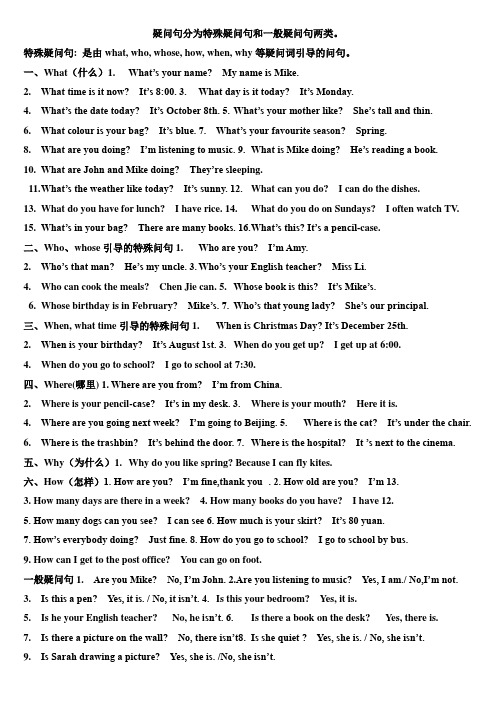
疑问句分为特殊疑问句和一般疑问句两类。
特殊疑问句: 是由what, who, whose, how, when, why等疑问词引导的问句。
一、What(什么)1. What’s your name? My name is Mike.2. What time is it now? It’s 8:00.3.What day is it today? It’s Monday.4. What’s the date today? It’s October 8th.5.What’s your mother like? She’s tall and thin.6. What colour is your bag? It’s blue.7.What’s your favourite season? Spring.8. What are you doing? I’m listening to music. 9.What is Mike doing? He’s reading a book.10. What are John and Mike doing? They’re sle eping.11. W hat’s the weather like today? It’s sunny. 12.What can you do? I can do the dishes.13. What do you have for lunch? I have rice. 14. What do you do on Sundays? I often watch TV.15. What’s in your bag? There are many books. 16.What’s this? It’s a pencil-case.二、Who、whose引导的特殊问句1. Who are you? I’m Amy.2. Who’s that man? He’s my uncle.3.Who’s your English teacher? Miss Li.4. Who can cook the meals? Chen Jie can.5. Whose book is this? It’s Mike’s.6. Whose birthday is in Februar y? Mike’s.7.Who’s that young lady? She’s our principal.三、When, what time引导的特殊问句1. When is Christmas Day? It’s December 25th.2. When is your birthday? It’s August 1st.3.When do you get up? I get up at 6:00.4. When do you go to school? I go to school at 7:30.四、Where(哪里) 1. Where are you from? I’m from China.2. Where is your pencil-case? It’s in my desk.3.Where is your mouth? Here it is.4. Where are you going next week? I’m going to Beijing.5.Where is the cat? It’s under the chair.6. Where is the trashbin? It’s behind the door.7.Where is the hospital? It ’s next to the cinema.五、Why(为什么)1. Why do you like spring? Because I can fly kites.六、How(怎样)1. How are you? I’m fine,thank you. 2. How old are you? I’m 13.3. How many days are there in a week?4. How many books do you have? I have 12.5. How many dogs can you see? I can see6. How much is your skirt? It’s 80 yuan.7. How’s everybody doing? Just fine. 8. How do you go to school? I go to school by bus.9. How can I get to the post office? You can go on foot.一般疑问句1. Are you Mike? No, I’m John. 2.Are you listening to music? Yes, I am./ No,I’m not. 3. Is this a pen? Yes, it is. / No, it isn’t. 4.Is this your bedroom? Yes, it is.5. Is he your English teacher? No, he i sn’t.6.Is there a book on the desk? Yes, there is.7. Is there a picture on the wall? No, there isn’t8.Is she quiet ? Yes, she is. / No, she isn’t.9. Is Sarah drawing a picture? Yes, she is. /No, she isn’t.10.Are these potatoes? Yes, they are./ No, they aren’t.11. Are those carrots? Yes, they are. /No,they aren’t. 12. Do you like English? Yes, I do./No, I don’t.13. Do you have a sister? Yes, I do./ No, I don’t. 14.Do you go to school on foot? Yes, I do. /No, I don’t. 15Does Mike have a sister? Yes, he does./No, he doesn’t.16.Does she like apples? Yes, she does./No, she doesn’t.17 Can you sweep the floor? Yes, I can./No, I can’t.18. Can Mike do the dishes? Yes, he can./No, he can’t.特殊疑问句专项训练(根据答句写问句)根据答句写出相应的问句。
最新版小学五年级英语上册重点知识及语法

最新版小学五年级英语上册重点知识及语法一、一般现在时(Present Simple)1.基本形式•行为动词:V原形例如:I play football.•助动词“be”:am/is/are例如:I am a student.•特殊疑问句例如:Does she like apples?2.第三人称单数•行为动词+s/es例如:She likes watching TV.•特殊疑问句例如:Does he speak Chinese?3.一般疑问句•行为动词 do/does 提前例如:Do you like swimming?•be动词进行疑问句例如:Are you a teacher?4.否定句•行为动词否定:do/does not(don’t/doesn’t)例如:I don’t eat meat.•be动词否定:am/are/is not(am not/aren’t/isn’t)例如:She isn’t happy now.二、形容词和副词1.形容词的比较级和最高级•一般原则:+er / the+最高级例如:The weather is getting colder and colder.•不规则变化例如:good-better-the best2.副词的比较级和最高级•一般原则:+er / the+最高级例如:She runs faster than her brother.•不规则变化例如:well-better-the best3.修饰形容词或副词的副词•修饰形容词:very/so例如:He is very cute.•修饰副词:very/really例如:She runs really fast.三、名词和冠词1.名词的单数和复数•一般规则:+s例如:The boy has two cats.•不规则变化例如:man-men/woman-women•特殊规则:-y变-i+es / -f/-fe变-ves例如:The baby cries loudly.2.冠词•定冠词the例如:The book on the table is mine.•不定冠词a/an例如:I want to be a teacher.四、动词时态和语态1.现在进行时•am/is/are+Ving例如:I am reading a book.2.一般将来时•will+V原形例如:I will go to sleep at 10 pm tonight.3.被动语态•am/is/are+被动语态例如:The song is sung by the choir.五、情态动词1.能力•can/could例如:I can swim well.2.请求•may/could例如:Could you please turn off the light?3.建议•should/ought to例如:You should eat more vegetables.4.可能性•may/might例如:It may rain tomorrow.六、疑问代词和关系代词1.疑问代词•who/what/where/when例如:Who is she?2.关系代词•who/whom/which/that例如:The girl who is standing there is my sister.总结:小学五年级英语上册重点知识及语法包括一般现在时、形容词和副词、名词和冠词、动词时态和语态、情态动词、疑问代词和关系代词等内容。
新人教精通版五年级英语下册:Unit 5 Lesson 27--现在进行时特殊疑问句
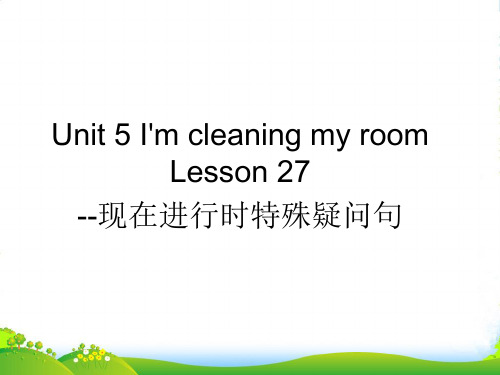
动词的现在分词
3、动词重读闭音节结尾,末尾只有一个辅 音字母——双写末尾辅音+“ing”。
sit hop cut swim
sitting hopping cutting swimming
stop jog run shop
stopping jogging running shopping
• 口诀:
动词的现在分词
2、动词以不发音的e结尾——去掉e加”ing”。
live write make take come
living writing making taking coming
ride dance move arrive drive
riding dancing moving arriving driving
He is having dinner.
What is he doing?
He is listening to her.
I am drinking wine. What are you doing?
Thank you!
•1、书籍是朋友,虽然没有热情,但是非常忠实。2022年2月14日星期一2022/2/142022/2/142022/2/14 •2、科学的灵感,决不是坐等可以等来的。如果说,科学上的发现有什么偶然的机遇的话,那么这种‘偶然的机遇’只能给那些学有素养的人,给那些善于独 立思考的人,给那些具有锲而不舍的人。2022年2月2022/2/142022/2/142022/2/142/14/2022 •3、书籍—通过心灵观察世界的窗口.住宅里没有书,犹如房间里没有窗户。2022/2/142022/2/14February 14, 2022 •4、享受阅读快乐,提高生活质量。2022/2/142022/2/142022/2/142022/2/14
五年级上册英语的特殊疑问句和答语的语句

五年级上册英语的特殊疑问句和答语的语句1. 引言1.1 概述五年级上册英语学习是小学阶段的重要部分,特殊疑问句作为其中的一个语法重点,对于学生提高英语口语和交流能力至关重要。
掌握特殊疑问句的构成和答语形式是理解和运用这一语法知识的基础。
本文将详细介绍五年级上册英语中特殊疑问句的构成以及常见的答语形式,并通过例子、练习和对话示范来加深读者对该主题的理解。
1.2 文章结构本文共分为五个部分,每个部分都涵盖了特殊疑问句与答语在五年级上册英语教材中的相关内容。
具体来说,第二部分将阐述特殊疑问句的构成,包括其基本结构,同时提供一些例子并配以相应的练习题;第三部分将介绍特殊疑问句的答语形式,包括带有特殊疑问词的答案以及简略回答与完整回答之间的区别;第四部分将探讨特殊疑问句在实际交流中应用的重要性,并分享一些良好沟通的技巧以及实际案例的分析与讨论;最后,第五部分将总结全文并展望未来学习,并分享一些建议和方法,同时给出对五年级上册英语学习的启示。
1.3 目的本文旨在帮助读者全面了解并掌握五年级上册英语中特殊疑问句和答语的相关知识。
通过详细介绍特殊疑问句的构成、答语形式以及在实际交流中的应用,读者可以更加自信地运用特殊疑问句进行英语口语表达。
希望本文能够为学生提供一个清晰、有序且易于理解的指导,进一步促进五年级上册英语学习水平的提高。
2. 特殊疑问句的构成:2.1 什么是特殊疑问句:特殊疑问句是用来询问具体信息的疑问句形式。
在英语中,特殊疑问句一般以特殊疑问词开头,这些特殊疑问词包括who(谁)、what(什么)、when(何时)、where(哪里)、why(为什么)等。
2.2 特殊疑问句的基本结构:特殊疑问句的基本结构是:特殊疑问词 + 助动词/情态动词/系动词+ 主语 + 其他部分。
- 特殊疑问词: 特殊疑问词用于提出具体信息的问题。
例如:- Who (谁) - 用于询问人物身份或姓名:Who is your bestfriend?(你最好的朋友是谁?)- What (什么) - 用于询问事物或情况:What is your favorite color?(你最喜欢的颜色是什么?)- When (何时) - 用于询问时间:When is your birthday?(你的生日是几号?)- Where (哪里) - 用于询问地点:Where did you go on vacation?(你去哪里度假了?)- Why (为什么) - 用于询问原因:Why are you late for school?(你为什么迟到了?)- 助动词/情态动词/系动词: 特殊疑问句通常包含助动词、情态动词或系动词,用于构建句子的语法结构。
五年级下册英语书25页的节日问五个特殊疑问句
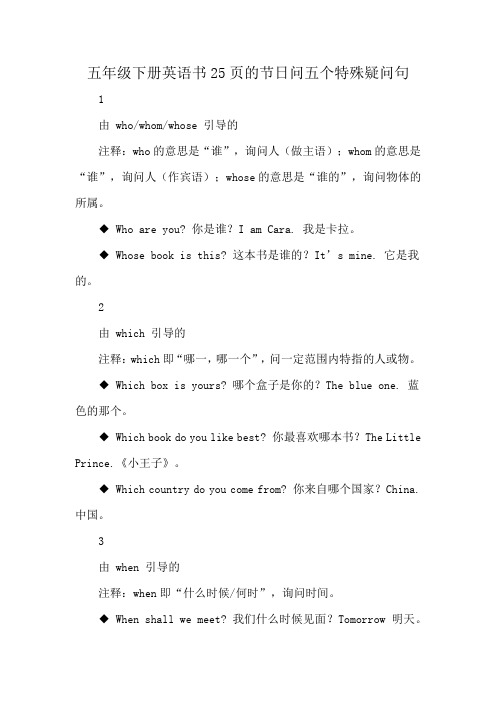
五年级下册英语书25页的节日问五个特殊疑问句1由 who/whom/whose 引导的注释:who的意思是“谁”,询问人(做主语);whom的意思是“谁”,询问人(作宾语);whose的意思是“谁的”,询问物体的所属。
◆ Who are you? 你是谁?I am Cara. 我是卡拉。
◆ Whose book is this? 这本书是谁的?It’s mine. 它是我的。
2由 which 引导的注释:which即“哪一,哪一个”,问一定范围内特指的人或物。
◆ Which box is yours? 哪个盒子是你的?The blue one. 蓝色的那个。
◆ Which book do you like best? 你最喜欢哪本书?The Little Prince.《小王子》。
◆ Which country do you come from? 你来自哪个国家?China. 中国。
3由 when 引导的注释:when即“什么时候/何时”,询问时间。
◆ When shall we meet? 我们什么时候见面?Tomorrow 明天。
◆ When is her birthday? 她什么时候生日?May 1 is her birthday. 五月一号是她的生日。
◆ When do you get up every day? 你每天什么时候起床?At 6:00 a.m. 早上六点。
4由 where 引导的注释:where即“哪里,在哪里”,询问地点。
◆ Where will you spend the summer holiday? 你会去哪里过暑假?I'm going to Hawaii. 我要去夏威夷。
◆ Where is your coat? 你的外套在哪啊?It’s on the sofa. 在沙发上。
5由 why 引导的注释:why即“为什么”,询问原因,回答从句一般由because 引导。
五年级英语特殊疑问句
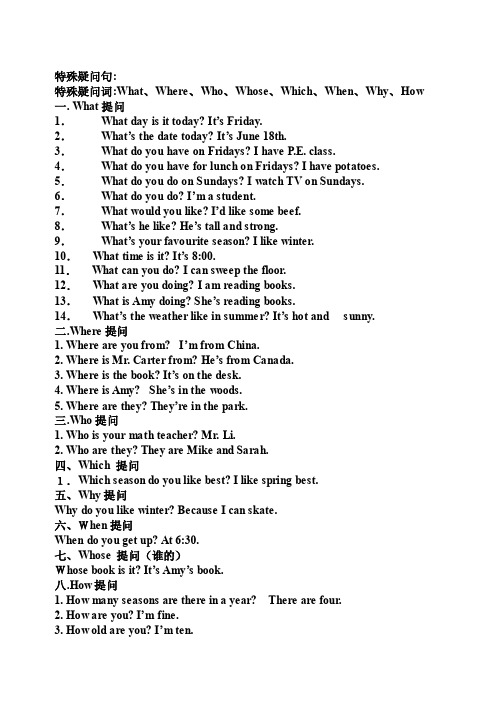
特殊疑问句:特殊疑问词:What、Where、Who、Whose、Which、When、Why、How 一. What提问1.What day is it today? It’s Friday.2.What’s the date today? It’s June 18th.3.What do you have on Fridays? I have P.E. class.4.What do you have for lunch on Fridays? I have potatoes. 5.What do you do on Sundays? I watch TV on Sundays.6.What do you do? I’m a student.7.What would you like? I’d like some beef.8.What’s he like? He’s tall and strong.9.What’s your favourite season? I like winter.10.What time is it? It’s 8:00.11.What can you do? I can sweep the floor.12.What are you doing? I am reading books.13.What is Amy doing? She’s reading books.14.What’s the weather like in summer? It’s hot and sunny.二.Where提问1. Where are you from? I’m from China.2. Where is Mr. Carter from? He’s from Canada.3. Where is the book? It’s on the desk.4. Where is Amy? She’s in the woods.5. Where are they? They’re in the park.三.Who提问1. Who is your math teacher? Mr. Li.2. Who are they? They are Mike and Sarah.四、Which 提问1.Which season do you like best? I like spring best.五、Why提问Why do you like winter? Because I can skate.六、When提问When do you get up? At 6:30.七、Whose 提问(谁的)Whose bo ok is it? It’s Amy’s book.八.How提问1. How many seasons are there in a year? There are four.2. How are you? I’m fine.3. How old are you? I’m ten.4. How do you do? How do you do?5. How much is it? It’s ten yuan.6. How much are they? They are ten yuan.7. How’s everybody here? Just fine.一般疑问句:一般疑问词: Do、Can、Are、Am、Is、Does一.May提问1. May I have a look? Sure!二.Is提问1. Is there a river? Y es, there is.2. Is he reading? Y es, he is.3. Is she quiet? No, she isn’t.4. Is this your bedroom? Y es, it is.5. Is he young? Y es, he is.三.Can提问1. Can you make the bed? Y es, I can. /No, I can’t. / Y es, we can /No, we can’t.2. Can Amy and Mike play chess? Y es, they can. / No, th ey can’t.3. Can tigers swim? Y es, they can. / No, they can’t.四.Do提问1. Do you like eggs? Y es, I do. /No, I don’t. /Y es, we do. /No, we don’t.2. Do they like to skate? Y es, they do. / No, they don’t.五.Are提问1. Are you eating lunch? Y es, we ar e. /No, we aren’t. /2. Are you a student? Y es, I am. /No, I am not.3. Are there any apples? Y es, there are. /No, there aren’t.4. Are they happy? Y es, they are. /No, they aren’t.六.Am 提问1. Am I a doctor? Y es, you are. / No, you aren’t.七.Does 提问1. Does she like fish? Y es, she does. /No, she doesn’t.2. Does he like coffee? Y es, he does. / No, he doesn’t.3. Does it often rain? Y es, it does. /No, it doesn’t.isn’t = is not aren’t = are not can’t = can notdon’t = do not doesn’t = does not。
人教版五年级特殊疑问句整理归纳

人教版五年级特殊疑问句整理归纳
五年级英语教材中的特殊疑问句主要包括以下几种形式:
1. Wh-疑问词 + 助动词/系动词/动词原形 + 主语?
例如:
- What is he doing?(他在做什么?)
- How old are you?(你多大了?)
- Where is your bag?(你的书包在哪里?)
2. Wh-疑问词 + be动词 + 主语 + 状语/地点状语?
例如:
- Where are you from?(你来自哪里?)
- How tall is the building?(这座楼有多高?)
3. Wh-疑问词 + 动词原形/助动词 + 其他成分 + 疑问词?
例如:
- Whose pen is this?(这是谁的钢笔?)
- Who can help me?(谁能帮助我?)
4. Yes/No疑问句:助动词/系动词/情态动词/动词原形 + 主语 + 其他补充成分?
例如:
- Can you swim?(你会游泳吗?)
- Are you Chinese?(你是中国人吗?)
- Did you eat breakfast?(你吃早饭了吗?)
需要注意的是,在提问时需要根据具体情境选择合适的特殊疑问词和动词形式,确保问句的准确性和流利性。
